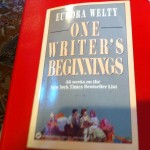 I read through Eudora Welty’s One Writer’s Beginnings this week. I’d read it decades ago, but after reading The Optimist’s Daughter earlier this year, I thought I’d pick it back up off my shelf (this is why I don’t get rid of things!)
I read through Eudora Welty’s One Writer’s Beginnings this week. I’d read it decades ago, but after reading The Optimist’s Daughter earlier this year, I thought I’d pick it back up off my shelf (this is why I don’t get rid of things!)
It’s a short and lovely memoir. Like The Optimist’s Daughter it packs a lot in with an economy bred of skill. One of those skills — and perhaps the most profound writing advice in the book — is knowing that reading is listening.
Writes Welty: “Ever since I was first read to, then started reading to myself, there has never been a line read that I didn’t hear. As my eyes followed the sentence, a voice was saying it silently to me. It isn’t my mother’s voice, or the voice of any person I can identify, certainly not my own. It is human, but inward, and it is inwardly that I listen to it. It is to me the voice of the story or the poem itself. The cadence, whatever it is that asks you to believe, the feeling that resides in the printed word, reaches me through the reader-voice. I have supposed, but never found out, that this is the case with all readers — to read as listeners — and with all writers, to write as listeners. It may be part of the desire to write. The sound of what falls on the page begins the process of testing it for truth, for me.”
I can pinpoint a few moments that I think improved my writing over the years. One was learning grammar through an independent study sophomore year in high school (plus devouring Strunk & White) and the other was when my editor at USA Today told me that when people are reading something, they’re really reading it out loud in their heads. This was truly a light bulb moment. I know Welty is getting at a bigger point here, but the technique is practical, too. Words have to sound good out loud. You are addressing people through the reader-voice.
Keeping this in mind creates good habits. You write shorter sentences. People run out of breath when they say things out loud! Or if you are given to long sentences, at least you alternate them with shorter sentences (for an example, see Welty’s paragraph, above). You use shorter words. You develop better rhythm, because rhythm is the most pleasing part of the spoken word. A good preacher does it naturally, with parallel structure and repetition. A good writer learns to sound like that.
I’ll admit that sometimes I’m careless with this. I write blog posts quickly, so I don’t go back and read them out loud. But with my books or longer articles, I aim to do this step. I love that Welty calls attention to this. It’s one of the best ways I’ve found to write better.
Do you read what you write out loud?
Coincidentally I read your blog post and then this piece from Carl Zimmer at the New York Times on what is going on in the brain while writing fiction – with the suggestion that experienced writers may ‘narrate with an inner voice’ while novices watch stories like a film….
http://www.nytimes.com/2014/06/19/science/researching-the-brain-of-writers.html?_r=1
Also interesting findings on how deliberate practice pays off
I write long academic pieces that are published relatively infrequently, so there is plenty of time to read all of the parts aloud. The oldest parts of the essays get read aloud many, many times.
I’ve always received good marks for “craftsmanship,” probably because many published essays in the social sciences are so poorly written. Also, I’ve wondered whether this might have something to do with the fact that I read more fiction than most of my academic friends. The conventions of academia have to be heeded–at least by a young-ish person–but it’s still possible to keep things somewhat lively and interesting.
Yes, I do read most things I write out loud. I don’t always do that with a quick blog post, but anything of any length I try to read out loud. It’s one of the most effective ways to root out awkwardness in writing.